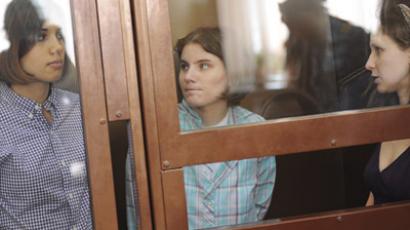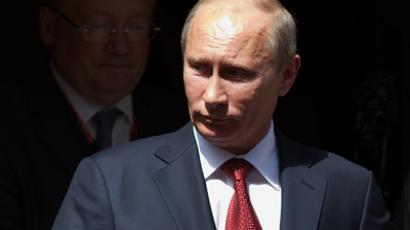Pussy Riot sentenced to two years in jail
A Moscow court has sentenced three members of Pussy Riot to two years in a medium-security prison for hooliganism motivated by religious hatred and enmity.
The six months the girls have spent in pre-trial custody will count as time served. The Judge said Nadezhda Tolokonnikova, Maria Alyokhina and Ekaterina Samutsevich showed flagrant disregard for church parishioners and the fundamentals of the Orthodox faith."The Court considers that social justice and prevention of further possible crimes can only be achieved by restricting the defendants' freedom and real imprisonment," Judge Syrova said. “By their actions, Samutsevich, Tolokonnikova and Alyokhina seriously disrupted public order and the day-to-day running of the Cathedral. They showed blatant disrespect to church-goers and workers, and in doing so gravely offended their religious sensibilities,” Judge Syrova stated announcing the verdict.The audience met the sentence with sporadic shouts "Shame on the Court!"It took the court just over three hours to read the whole verdict. Judge Syrova concluded that Pussy Riot’s "punk prayer" inflicted major “pain” and hurt the feelings of Orthodox believers, adding they also “disrupted the work of the Cathedral” since, beside their performance, they also “refused to leave.” Syrova said the motives of religious hatred could be proven by the fact that Pussy Riot targeted Russia’s sizable Orthodox community, choosing a major cathedral for their performance. The group's feminist beliefs are not compatible with church norms, the Judge pointed out adding that the Russian Constitution provides that different groups and cultures should treat each other with respect. Short bright dresses, loud singing, dancing – which are traditionally prohibited in Orthodox churches – as well as the “blasphemous lyrics” insulted preachers, Syrova said, asserting that the group had anticipated such a reaction. Still, the court took into account that Tolokonnikova and Alyokhina have small children, that all the three girls have no previous criminal records and received favorable reports from their employer and university.Prosecutors have been demanding that the three women be sentenced to three years in prison, while the defense hoped for their acquittal.
Pussy Riot lawyers: Unlawful sentence crowns mock trial
The defense team has ten days to appeal the verdict, but conflicting reports say they may choose not to and apply to other institutions instead, such as the European Court of Human Rights in Strasbourg, France. A medium-security prison may pose great risks to the health and security of any of the three women, defense attorney Mark Feigin told journalists after the trial."The sentence was absolutely unlawful. Victims and some witnesses were reported to give evidence they never gave," Feigin said. "This was a mock proceeding and the sentence crowns it."Some 100 foreign journalists, including those from countries likes Japan and Australia, gathered at Khamovnichesky Court on Friday. The infamous case has sparked international interest for the last few months, with high-profile figures both condemning the three women and offering their support. Many branded the trial as politically motivated.
'There is no court. It is an illusion'
The three convicts – Nadezhda Tolokonnikova, Maria Alyokhina and Ekaterina Samutsevich – have maintained their innocence in charges of 'hooliganism motivated by religious hatred' during the final testimonies in court.Tolokonnikova said that she did not regret her actions: “No, of course not. We’re happy that we unexpectedly became the epicenter of such a large political event in which so many different forces are in play,” she told Russian news magazine Novaya Gazeta.“I don’t believe in the court’s decision at all… There is no court. It is an illusion.”“The whole world is saying that we are not guilty. They talk about it at concerts, on the internet, in the press and in parliament. The whole world is saying ‘they’re not guilty!’" said Ekaterina Samutsevich.The trial “embodied a travesty of justice” based on an “absurd act that has snowballed into an enormous catastrophe,” Maria Alyokhina said.The politically-charged “punk prayer” was not a personal attack on Putin, but on the political system he created, she said.
Tolokonnikova argued that the prosecution was trampling on the fundamentals of Christianity: “It was not in vain that when Christ was among the prostitutes, he said that those who falter should be helped, I do not see this in our trial.”The punk trio decried Judge Marina Syrova as biased, and demanded her recusal from the case several times, requests that were swiftly denied by the judge.Syrova was taken under state protection after receiving a barrage of threats following Pussy Riot's final testimonies in court last Wednesday.The case went to court on June 20 after several months of delays, prompting complaints from both the defendants and the prosecution. The judicial process has been the target of frequent criticism, avidly followed by Western media.The three band members went on hunger strike in protest of the short amount of time they were given to study their case. They also accused the judge of torturing them, claiming they were not granted sufficient time to eat and sleep during the trial.The three women were taken into custody in February for the performance of the profanity-laden prayer, 'Mother of God, drive Putin away' in the Cathedral of Christ the Savior, Moscow’s main Orthodox church. Those who witnessed the prayer said the women had offended their religious sensibilities, though the women argued that was never their intention.
Case divides Russia, as world pop stars back Pussy Riot
The case has apparently divided Russian society into those who think Pussy Riot’s actions deserve to be punished harshly, and those who think there was no criminal intent. A July poll conducted by Levada Center, a prominent Russian polling agency, showed that 58 per cent of Russians believed that the punishment demanded by the prosecution was too harsh, while only 33 per cent agreed that it was adequate. Earlier figures in March and April showed that the number of people thinking that imprisonment was the right way to punish the trio was much higher at that time. Human rights groups such as Amnesty International and the Moscow-Helsinki Group rallied behind the women, saying they were victims of political persecution. Several Russian artists and intellectuals signed a petition calling for them to be released on bail and for their criminal charges to be replaced with administrative ones. As the trial went ahead, international superstars such as Paul McCartney, Madonna, Sting, The Red Hot Chili Peppers, Faith No More and a handful of other legendary pop and rock artists and ensembles voiced support for Pussy Riot. The public in Russia and throughout the world also staged rallies to back the women on trial. Many protesters wore balaclavas and garb similar those worn by Pussy Riot. Some went as far as to sew their mouths shut, and to stage a fake crucifixion.The Pussy Riot trial was even a topic for discussion in Vladimir Putin’s meeting with British Prime Minister David Cameron. Putin said he hoped the court would reach a “right and reasonable” verdict in the case, but noted that the girls should not be judged “too harshly.”
Watch photos from worldwide rallies to support Pussy Riot in RT's Galleries
Read related column here














